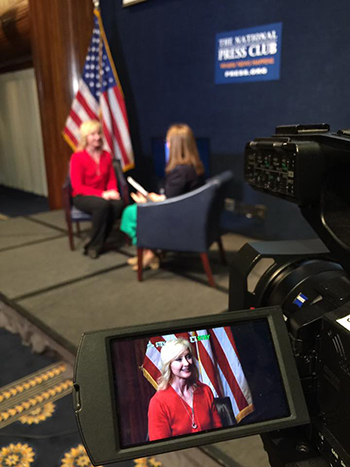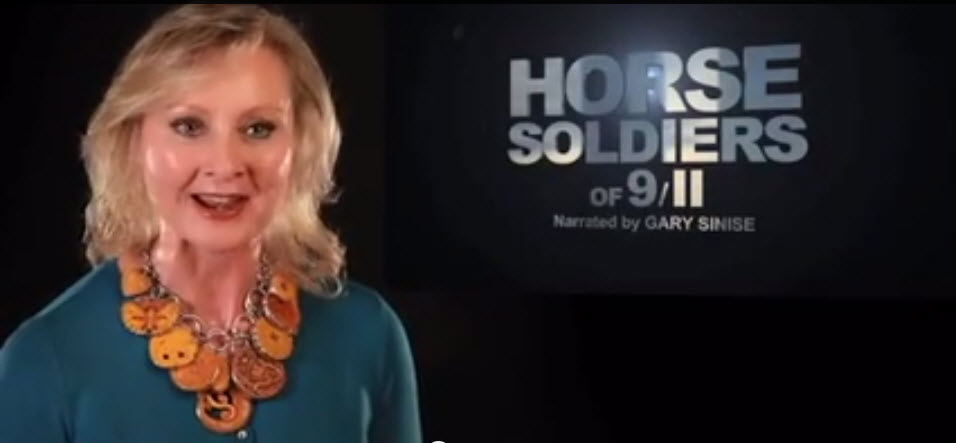Ask University of Washington alumna Alex Quade to describe a memorable moment from her journalism career, and she will quickly rattle off half a dozen. There was the time a Green Beret gunner needed her to help feed more ammunition into his .50-caliber machine gun during a firefight. Or the time she filmed a special combat engineer dismantling a car bomb two feet away. Or the many times she comforted wounded soldiers. The list goes on and on.

Quade (BA, Communication, Speech Communication, Political Science, 1992) is a freelance war reporter who covers U.S. Special Operations Forces on combat missions. She is the only reporter, male or female, who has embedded long-term with these elite secretive units. Quade spends months at a time in the field, using a hand-held video camera and notepad to capture stories about combat, including the personal stories of Special Forces on the front lines.
“My goal is simple: to make the inaccessible feel relevant to the American people,” she says. “I tell the human stories behind the hardware, combat stories from the heart. I want to bring the audience along for the ride, to share the human experience, not strategy nor politics. I want to make people pay attention and shake them out of indifference.”
Before donning combat gear in far-flung places like Iraq and Afghanistan, Quade worked more traditional journalism jobs. She started as a White House Press Office intern, then worked as a producer and reporter for Fox News and CNN. But combat reporting was always her goal. She embedded with an elite unit in 1998 and never looked back.

“I was mostly concerned with not messing up, getting the story, doing what I’m supposed to do,” she recalls of her first time working in a combat setting. “Just like the soldiers I cover, I’d done everything I could to prepare. At that point, it was just ‘game on’ and laser focus on the job ahead.”
That laser focus has helped Quade gain the trust of Special Ops leadership who rarely welcome journalists into their world. “They operate in secret, and it’s high stakes,” says Quade. “What they do has life-and-death repercussions, so they’re not going to let just anyone in. I must prove myself every time: by my candor, courage, integrity, and most importantly, by getting the story right and not being a burden to the teams I’m with.”
Quade has accomplished that brilliantly according to those who have worked with her. Senior Weapons Sergeant James A. Baker, retired Green Beret of the 10th Special Forces Group, recalls that Quade blended in and became part of the A-team when she embedded with his Operational Detachment. “She’s like us,” he says, offering the ultimate compliment. “If there’s another step to take, she’s going to take it and go as far as she can. Not everybody can do that. It’s just who she is. If it can be done, she can do it.”
I tell…combat stories from the heart. …I want to make people pay attention and shake them out of indifference.
“The truth of these soldiers’ lives cannot truly be shared from a TV studio in New York City, or from the occasional anchorperson dropping in,” Quade says. “Freelancing allows me the opportunity to spend more time going out on more missions with the Special Operators, learning firsthand about them and witnessing what they do, so I can responsibly do justice to their stories and answer the questions of their families and the American public.”
Quade’s stories have run the gamut from profiles of Green Berets, to coverage of a fighter jet shot down in Iraq, to the first broadcast interview of the SEAL Team 6 member who shot Osama bin Laden. Her reports air on major TV news outlets and have been published in The New York Times, CNN.com, Military.com, and other publications. She has produced more than a dozen special series and documentaries including Danger Close, released earlier this year.
Admirers of Quade’s work include former Secretary of Defense Robert Gates, who praises her “first-hand portrayals of graphic combat operations,” and Major General (retired) Mike Repass, former Commanding General of U.S. Army Special Forces, who describes Quade as “the real deal.” Repass notes that Quade has spent more time with Special Forces operators than any other reporter. “Alex nails the essence of sacrifice found in America’s Special Forces operators and their families,” he says. “She…is uniquely qualified to tell their intensely-lived, extraordinary stories.”

For her tenacity and extraordinary reporting, Quade has been honored with numerous awards, including two national Edward R Murrow Awards and a Congressional Medal of Honor Society award for excellence in journalism. “My awards belong to the people in my stories, who had the courage to allow me in, to share their stories so we can learn from them,” Quade says.
Now Quade is tackling another challenge: writing a book that offers her behind-the-scenes perspective of secret missions and the “Quiet Professionals” of the Special Forces. Tentatively titled Danger Close (the same as her latest film), the book is slated for publication in 2018. She hopes the book, like her other work, will shed light on the realities of secretive units in combat and its aftermath.
“Witnessing the atrocities of humanity and the suffering of others hurts. The anguish, tragedy, and conflict can be heartbreaking,” she says. “I report the good, the bad, and the ugly. I write and report because I must. The Special Operators never leave anyone behind, and that’s how I feel about their stories. Their stories should all come home too, so that the truth is not left behind.”
The story was written by Nancy Joseph and originally published at the University of Washington’s Perspective.





